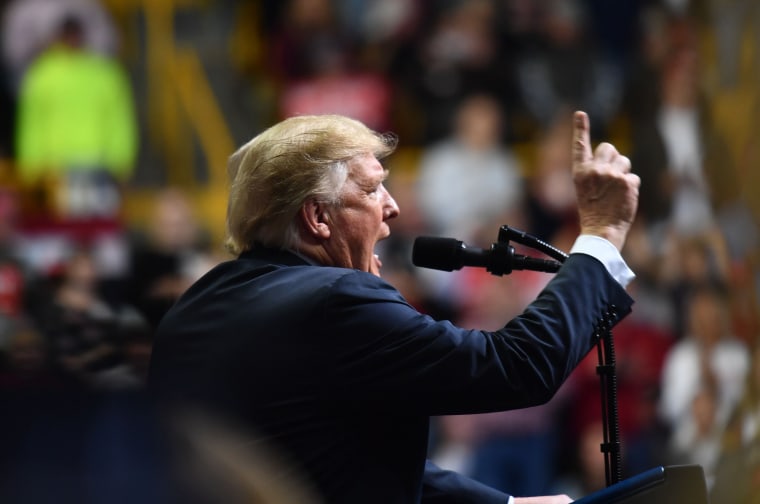WASHINGTON — After largely standing by President Donald Trump as he has led his party for the past two-plus years, some Republicans now worry that his campaign rhetoric has gone too far and will cost some GOP candidates their races and jobs in Tuesday's midterm elections.
Trump has spent the final stretch of this election season in some of the most conservative areas in the country, rallying his base of supporters by warning that Democrats will usher in an age of "socialism" and "open borders" if voters put them in charge of either chamber of Congress.
He has raised the prospect of passing an executive order to end birthright citizenship, which most legal scholars say can only be changed through a constitutional amendment or Congress, and he vowed to deploy thousands of U.S. troops to the border to meet the caravan of migrants traveling from central America.
Now, as voters head to the polls, some Republicans worry that message could backfire and cost some of the most vulnerable GOP House incumbents and candidates in suburban districts or in districts with larger minority populations.
“This stupid birthright stuff is hard-right fringe and loses us Hispanics and Cubans" in places like California and Florida, said one moderate Republican House member. “It juices Hispanic turnout in exurbs for potentially one to three points and is another reminder why Trump’s doom and gloom bullshit is so off-putting.”
Some Republicans have been arguing that the party should focus on their accomplishments over the past two years as well as the strong economy.
House Speaker Paul Ryan has been emphasizing the economy on the campaign trail. And his top messaging strategist, Brendan Buck, tweeted just four days before Election Day, “we’re going to spend all day and weekend talking about the strong economy, right?”
The economy has continued to add jobs through the first 21 months of Trump’s term at a similar pace as the last two years of President Barack Obama’s term. Republicans point to their tax cuts and reduction of regulations as proof that their policies have helped to keep the economy growing.
It’s a message that they say appeals to a broader swath of voters who might stay in the Republican fold despite unease over Trump's often divisive and combative rhetoric.
But Trump has stepped all over that message in an attempt to help Republicans running for Senate in states he won in 2016, including Missouri, Indiana, Tennessee, Montana and Texas.
Ryan and Trump spoke on the phone Sunday about the election. On the call, Ryan asked Trump to talk up the economy, according to a Politico report, a topic Trump has sidelined in favor of his focus on immigration.
Ryan downplayed the friction, telling Fox News on Monday night that his message is that Republicans can campaign on “both” issues simultaneously.
On Monday, FoxNews.com published an op-ed from the president, who pointed to the economy as his closing argument for the elections. Touting the positive economic news, he wrote that "these things didn’t happen by accident. They happened because Republicans are putting American workers and families first."
But it might be too little, too late. One Republican strategist said that Rep. John Culberson, who is in a tough re-election bid in a solidly Republican district in the Houston area, was polling four points ahead of his opponent, Democrat Lizzie Pannill Fletcher, in the days after the confirmation of Brett Kavanaugh to the Supreme Court.
After Trump escalated his anti-immigrant rhetoric and visited Houston, internal polling showed Culberson down three points.
In some races, including Culberson's, “the certain tone and the certain issues he’s chosen to focus on is not helpful” the Republican strategist said.
Trump’s harsh immigration rhetoric could affect Republicans in tight House races in Florida’s heavily agricultural 15th District, where migrant farm labor is an economic necessity, and its heavily Hispanic 26th District — both of which are in play on Tuesday. And Republicans are worried that it won’t just affect districts with such particular demographic and economic ties to immigration issues.
“Trump going Trump on this prevented us from talking about the economy,” said Florida-based Republican strategist Rick Wilson, who is a frequent critic of the president. “This is not a message that says ‘hey, suburban women come back and vote Republican again.’ If there’s an exact opposite of that message, it’s this stuff."
Other vulnerable Republicans are trying to counter Trump by focusing their campaign on local issues. Rep. Jeff Denham, who represents an agriculture district with a large Hispanic population in central California, has ignored Trump's national messaging on immigration and instead focused largely on water, a crucial issue there.
But if Republicans lose a large number of seats, someone will be blamed. And some Republicans are already pointing the finger at Trump.


